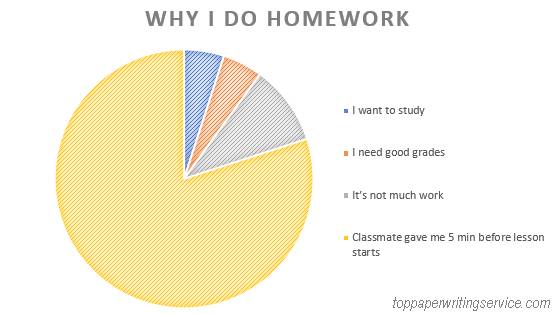
If you ask a teacher to stop giving too much homework to their students, they won’t think twice before saying that you have no idea what you’re talking about. They are convinced that homework is useful. They believe that it helps students to verify the knowledge that they just obtained during class. It gets them to research more, and it’s a good way for them to repeat what they already know.
Yes. Homework assignments have a big advantage, since they help students to retain knowledge. However, there are other methods that can lead to the same effects without all the disadvantages that homework has.
Let’s ask students: “Is homework harmful or helpful?” Most of them will say that it’s harmful. It takes their free time away, it’s boring, and they don’t want to do it. Some of the reasons are valid.
Let’s discuss 5 strong reasons why students shouldn’t have homework, so maybe the teachers will start questioning their old-school practices.
5 Negative Effects of Homework
Homework Makes Students Less Enthusiastic about School
In 2018, Today published a story about a second-grade teacher who got rid of all homework whatsoever. Instead of completing formal assignments, the teacher encouraged her students to spend quality time with their family. She recommends playing outside, reading together, eating dinner as a family, and going to bed early.
According to her evaluations, the no-homework policy worked. She realized that when they weren’t getting homework, her students were more enthusiastic to come to class and get involved in the learning process.
This teacher strongly believes that student work should be relevant, engaging, and meaningful no matter when and where it’s done. Formal assignments have little meaning, and students are annoyed by them.
Homework Consumes the Entire Free Time a Student Has
When a student gets home from school, they rest and eat a healthy meal. Then, they have to spend at least two hours studying, so they won’t accumulate too much material before the tests and exams. They have to rest after that.
But then, instead of using their free time to do something they enjoy, they have to write homework. By the time they are done with it, they are too tired to do anything.
Homework consumes valuable time that the student would rather spend with friends and family. This makes them feel alienated from their parents, since they can’t have long, casual conversations throughout the week. They can’t enjoy any activities with their friends. If they engage in extracurriculars, they are still related to school and considered as homework.

Homework Doesn’t Actually Improve Learning
Alfie Kohn, the author of The Homework Myth, tried to answer an important question in his book: does homework improve academic achievement? The answer is: not likely.
The students who want to learn will do it without the formal assignments. For those who aren’t inspired to learn, homework adds yet another burden that makes the process boring and unappealing. They will copy someone else’s homework, hire an academic writing service, or skip the assignment entirely.
Karen Dikson, a college instructor and HuffPost contributor shares her opinion:
Teachers should focus on engaging their students in other ways. They should make the lectures fun, and they should awaken a student’s curiosity. The occasional homework assignment is fine, but giving too much homework is bad. Period.
Homework Increases a Student’s Negative Attitude Towards School
Is there anyone who enjoys doing homework? No. But when it’s mandatory, the students are pressured by their teachers and parents to do it. That leads students to developing a negative attitude towards homework and towards school in general.
Just think about it:
- The students are pressured to do something that they don’t enjoy.
- When the student doesn’t understand an assignment, the parent can’t always explain it. They are left on their own to figure things out.
- Sometimes students are forced to copy or cheat. They know that this is not what they should do, but they don’t see another way out. It makes them think less of themselves.
- Homework increases the differences between low and high achievers. Those who have troubles completing develop the fixed mindset, which extends throughout their lives.
All these factors make students feel bad about school. They don’t like it, and they are trying to find different ways to cheat.
Homework Is Stressful
The pressure from their parents, the constant comparisons with other students, and the lack of free time add to the overall stress levels that students feel.
They have to worry about reading assigned books, writing essays, solving math problems, and preparing presentations for class. They are in a constant struggle to achieve important goals. When they don’t achieve them all, they feel like a failure.
Homework Isn’t Necessary
Students can still achieve great results without too many homework assignments on their back. In fact, they will have more time for productive research and studying. They will focus on the things that interest them the most.
Teachers can find other ways to balance out the gap between schoolwork and home studies. They can invite the students in a private Facebook group, where they will learn through discussions. They can also offer additional classes for the students who lag behind. That’s a more productive way to mitigate the differences between high and low achievers.